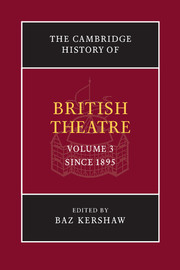Book contents
- Frontmatter
- Part I 1895–1946
- Part II Scottish and Welsh Theatres, 1895–2002
- Part III 1940–2002
- 13 British theatre, 1940–2002: an introduction
- 14 The establishment of mainstream theatre, 1946–1979
- 15 Alternative theatres, 1946–2000
- 16 Developments in the profession of theatre, 1946–2000
- 17 Case study: Theatre Workshop’s Oh What a Lovely War, 1963
- 18 1979 and after: a view
- 19 British theatre and commerce, 1979–2000
- 20 New theatre for new times: decentralisation, innovation and pluralism, 1975–2000
- 21 Theatre in Scotland in the 1990s and beyond
- 22 Theatre in Wales in the 1990s and beyond
- 23 English theatre in the 1990s and beyond
- Bibliography
- Index
- References
19 - British theatre and commerce, 1979–2000
from Part III - 1940–2002
Published online by Cambridge University Press: 28 March 2008
- Frontmatter
- Part I 1895–1946
- Part II Scottish and Welsh Theatres, 1895–2002
- Part III 1940–2002
- 13 British theatre, 1940–2002: an introduction
- 14 The establishment of mainstream theatre, 1946–1979
- 15 Alternative theatres, 1946–2000
- 16 Developments in the profession of theatre, 1946–2000
- 17 Case study: Theatre Workshop’s Oh What a Lovely War, 1963
- 18 1979 and after: a view
- 19 British theatre and commerce, 1979–2000
- 20 New theatre for new times: decentralisation, innovation and pluralism, 1975–2000
- 21 Theatre in Scotland in the 1990s and beyond
- 22 Theatre in Wales in the 1990s and beyond
- 23 English theatre in the 1990s and beyond
- Bibliography
- Index
- References
Summary
We no longer talk of subsidy: we speak of investment. We no longer justify the theatre on grounds of spiritual nourishment, intellectual stimulus or communal pleasure: we talk inevitably of ‘an important strand in our export drive’ and of ‘quick and sizeable returns’ that will follow an increase in arts funding.
As Michael Billington indicates here, some of the main developments in British theatre since 1979 did not originate with aesthetics but rather with ideology and economics. Theatre has been a business for centuries, of course, even if its institutional and financial basis was often invisible in the discussion of performances, but it is unlikely that Billington could have written this any earlier in the post-World War Two period. He registers a process of commodification, in which the relationships between plays, practitioners, writers and audiences have become defined by the terms of free-market economics. As a result, from about the early 1980s justifications for theatre as a cultural practice became increasingly determined by its value as a commercial activity, with profound consequences for the kinds of theatre that were produced in the final decades of the twentieth century.
The processes considered here are complex, and to discuss them will involve looking first at the political context for the changing relationship of theatre to commerce and the state, in a climate dominated by government intervention to introduce monetarism and major structural changes to the British economy. This included the forging of a new partnership between ‘public’ and ‘private’ sources of funding. The kind of theatre that was produced as a result will then be considered, as will some of the most significant political and cultural consequences of commodification.
- Type
- Chapter
- Information
- The Cambridge History of British Theatre , pp. 426 - 447Publisher: Cambridge University PressPrint publication year: 2004
References
- 1
- Cited by



